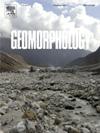Morphometric characteristics of glacial cirques and former glaciers in the Geyik Mountains, Western Taurus, Türkiye
IF 3.1
2区 地球科学
Q2 GEOGRAPHY, PHYSICAL
引用次数: 0
Abstract
Using the Glacier reconstruction (GlaRe) toolbox, reconstructions of former glaciers in the Geyik Mountains, part of the Taurus Mountain system in southern Türkiye, show that an area of 132.5 km2 was glaciated in the last major glaciation, which left clear terminal and hummocky moraines. Glaciers were 1.4 to 12 km long and those from 49 cirques merged to form a broad 75 km2 piedmont glacier in the Namaras Valley, up to 400 m thick. A thorough analysis of morphometry of the 98 Geyik cirques, using the revised Automated Cirque Metric Extraction version 2 (ACME2) toolbox, shows that they are relatively small, with limited widths: the median length/width ratio of 1.29 is unusually high. With size, length and width increase faster than depth, demonstrating strong static allometry. Maximum slope averages 59°, minimum 3.3° and axial 25°. A combination of low hypsometric integral, high axial profile closure and high axial height-length integral is proposed as a measure of cirque development.
The main summits are on sharp ridges on cirque crests, showing that they have been lowered by glacial erosion (by cirque development). Glaciation was strongly asymmetric, with cirque vector mean aspect between northeast and north-northeast. This shows the dominance of solar radiation effects, with some modification from westerly winds. Glacier palaeo- Equilibrium Line Altitudes (pELAs) rise northeastwards and cirque floor minimum altitudes (CFAs) rise toward east-northeast, both showing the importance of moist air from the Mediterranean, 38–55 km to the southwest. pELA averages 2208 m above sea level (a.s.l.) (2277 m area-weighted); CFA averages 2234 m. CFA varies mainly with summit altitudes; where related palaeoglaciers are short CFA is somewhat below pELA, but for longer ones it is above. The most likely palaeoclimate to form these glaciers involves a precipitation increase of 53–72 % with a temperature fall of 8 °C compared with present-day. The cirques formed under similar or less severe conditions.
图尔基耶西金牛座盖伊克山冰川圈和前冰川的形态特征
利用冰川重建(GlaRe)工具箱,对土耳其南部金牛山系盖伊克山脉(Geyik Mountains)的前冰川进行了重建,结果表明,在上一次大冰川作用中,132.5 平方公里的区域被冰川覆盖,并留下了清晰的末端冰碛和沼泽冰碛。冰川长 1.4 至 12 千米,49 个冰川圈的冰川汇合在一起,在纳马拉斯山谷形成了 75 平方千米宽的山麓冰川,厚度达 400 米。使用修订后的自动冰川度量提取工具箱 2(ACME2)对 98 个盖伊克冰川圈的形态进行的全面分析表明,这些冰川圈相对较小,宽度有限:中位数长宽比为 1.29,异常之高。随着体积的增大,长度和宽度的增加速度快于深度,显示出很强的静态几何特性。最大斜度平均为 59°,最小为 3.3°,轴向为 25°。主要山顶位于盘旋山脊上的尖锐山脊上,表明这些山顶因冰川侵蚀(盘旋发育)而降低。冰川作用具有很强的不对称性,山圈矢量的平均方向介于东北和东北偏北之间。这表明太阳辐射效应占主导地位,西风对其有一定的影响。冰川古平衡线海拔(pELA)向东北方向升高,峡谷底最低海拔(CFA)向东北偏东方向升高,两者都显示了来自西南 38-55 公里处地中海的潮湿空气的重要性。CFA主要随山顶高度而变化;相关古冰川较短时,CFA略低于pELA,但较长时则高于pELA。形成这些冰川的最可能的古气候是降水量比现在增加 53-72%,温度比现在下降 8 °C。冰川圈是在类似或不太严重的条件下形成的。
本文章由计算机程序翻译,如有差异,请以英文原文为准。
求助全文
约1分钟内获得全文
求助全文
来源期刊

Geomorphology
地学-地球科学综合
CiteScore
8.00
自引率
10.30%
发文量
309
审稿时长
3.4 months
期刊介绍:
Our journal''s scope includes geomorphic themes of: tectonics and regional structure; glacial processes and landforms; fluvial sequences, Quaternary environmental change and dating; fluvial processes and landforms; mass movement, slopes and periglacial processes; hillslopes and soil erosion; weathering, karst and soils; aeolian processes and landforms, coastal dunes and arid environments; coastal and marine processes, estuaries and lakes; modelling, theoretical and quantitative geomorphology; DEM, GIS and remote sensing methods and applications; hazards, applied and planetary geomorphology; and volcanics.
 求助内容:
求助内容: 应助结果提醒方式:
应助结果提醒方式:


